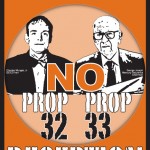

The “B” word may have been the most lethal weapon against an automobile insurance portable persistency initiative put to Californians, the second such initiative in the last two years to be defeated.
California’s Proposition 33, the 2012 Automobile Insurance Discount Act, was defeated with 54.6 percent voting against it, while it got 45.4 percent “yes” votes.
It’s possible Prop. 33, whose attackers persistently threw out the “B” word when talking about the initiative in order to associate it with its billionaire backer, was associated in the minds of voters with another initiative with billionaire backers
Two years ago Proposition 17, a similar portable persistency discount initiative, lost by 2 percent. Both propositions were backed largely by Mercury Insurance Chairman George Joseph, who said portable persistency would be good for consumers and create healthy competition among auto insurers. Joseph personally sunk more than $16 million into Prop. 33, and Prop. 17.
During the campaign Prop. 33 was bombarded with attacks, many focused on Joseph, a billionaire. Prop. 33 in advertisements and news reports was often lumped with Prop. 32, another ballot initiative that was attacked as being backed by billionaires. Prop. 32’s backers included among others the Koch Brothers, and Charles Munger Jr,. and it proposed outlawing the use of automatic payroll deductions from union members and corporations for political purposes. Prop. 32 was defeated 56.1 percent to 43.9 percent.
Prior to the election Joseph lamented Prop. 33 going next to 32 on the ballot, and called the numbering and placement of the two “a curious situation.”
The main opposition to Prop. 33 was Santa Monica, Calif.-based Consumer Watchdog, which waged a dogged war with Prop. 33 backers, bringing charges of discrimination, allegations of dishonesty and even international politics into the campaign.

Consumer Watchdog, which also successfully fought Prop. 17, spared few opportunities to use the word “billionaire” when discussing Prop. 33. In fact the group published campaign literature that tied Prop. 32 and Prop. 33 with the words “billionaire proposition” and “billionaire deception.”
The night of the election as Prop. 33’s fate was sealed, Consumer Watchdog again attacked Joesph:
“Insurance billionaire Joseph spent a total $17,478,547 on Prop 33, including $423,000 in the last 10 days that was reported as Independent Expenditures. Opponents, including Consumer Watchdog, were outspent 70 to 1. Prop 33 is a repeat of Prop 17, which voters rejected in June 2010, and Joseph’s Mercury Insurance Company spent $16 million to pass it.”
Joseph personally spent the money, and has noted Prop. 33 was not backed by Mercury the company.
A Prop. 33 campaign consultant said polling they conducted showed voters may have lumped it with Prop. 32 in their minds and as they were casting their ballots.
“We saw in the polling that those voting ‘no’ on 32 were voting ‘no’ on 33,” said Terry McHale, Prop. 33’s campaign consultant. “They tracked very similar.”
He added with some sarcasm, “Obviously it was not a great night for billionaires.”
Consumer Watchdog’s argument on Prop. 33 was it would unfairly punish drivers without prior insurance and would undermine existing consumer protections in California law, specifically Proposition 103, which Consumer Watchdog founder Harvey Rosenfield authored.
The Prop. 33 campaign’s argument was the initiative would promote competition among insurers, enable consumers to use their loyalty discount to shop for the best prices and it will protect members of the military serving overseas and those who lost their jobs due to the economy from losing their discount.
Many newspaper editorials came out against Prop. 33, but backers of the initiative successfully won over the support of myriad business and veterans groups.
Consumer Watchdog spokeswoman Carmen Balber said Prop. 33’s defeat was a message from the voters.
“Companies and billionaires that are putting measures on the ballot in their own self-interest should beware,” she said. “The voters are smarter than that and see through even millions of dollars in deceptive campaigning.”
She added, “it’s a victory for truth is what it was.”
McHale said the Prop. 33 battle was about truth.
“The truth is we believed very strongly in it,” McHale said. “We thought that it would create a more robust insurance market, we believed people would get insurance at a better price on this, but the voters rejected it.”
Joseph wasn’t immediately available, and it’s not known if he’ll go for a third try at portable persistency.
Balber said Consumer Watchdog was surprised at the second go around.
“Your guess is as good as mine,” she said in answer to a question of whether they think they’ll see the issue again in two years or in the future. “Who would have expected them to come back this time?”